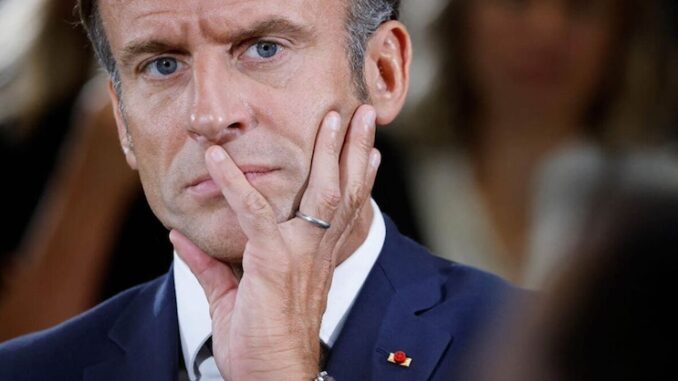The French government has been forced to disband as millions of citizens reject the WEF agenda in France and take back control of their country.
On Wednesday 4th December, French PM Barnier lost a no-confidence vote (with 331 votes – 288 was needed) forcing his government’s resignation and Macron to urgently appoint a new premier.
Infowars.com reports: The debate before the vote was lively with RN’s Le Pen blasting Barnier’s budget and making it clear he was dead in the water.
“It’s the end of this ephemeral government,” Le Pen declares.
Much of her comments are focused on taxes in Barnier’s budget, saying it was “all about taxes, taxes and more taxes.”
“Where’s all the money? The French want to know,” she said.
“To those who think I’m intent on choosing a policy of disaster through a vote of no confidence, I want to tell them that the disastrous policy would be not to censure such a budget, such a government,” Le Pen says.
Boris Vallaud, the head of the Socialists in parliament called Barnier’s budget “unjust and inefficient” and confirmed he would vote against Barnier.
France unbowed’s Coquerel slammed the government for not making enough compromises on the budget and confirms his party is supporting the no-confidence motion put forth by the leftist coalition.

The prime minister notes that the same issues will confront the next government if his is toppled, saying he would have “liked to have distributed money even though there isn’t any.”
“This won’t disappear with the magic of a no-confidence motion.”
What happens next?
- First, Barnier would tender the resignation of the government; his outgoing cabinet would remain in place with limited powers to manage current affairs.
- This caretaker administration continues until Macron appoints a new premier. There is no constitutional time limit for this decision — and it took Macron nearly two months to select Barnier.
- During the interregnum, the government would likely rely on untested emergency legislation to collect taxes and deliver vital spending.
- Once named, a new prime minister would propose a cabinet to be appointed by the president, and that new government would present a 2025 budget to parliament
Macron has a history of finding unexpected people to be prime minister – and of changing his mind at last minute.
Here are some names circulating in Paris that could become the next premier:
- Bernard Cazeneuve, 61: Former French prime minister and interior minister under Socialist President Francois Hollande. Already considered as a possible PM this summer, picking him could help Macron fracture the left-wing bloc by capitalizing on Cazeneuve’s ties to his former party.
- Sébastien Lecornu, 38: A skilled politician who in 2022 became the youngest defense minister since the French Revolution. He’s a Macron loyalist who’s originally from the center-right Republicans party.
- François Bayrou, 73: The veteran centrist leads the MoDem party, a key ally for Macron in parliament. Currently the high commissioner for government planning, Bayrou supports proportional representation in parliamentary elections, which has also been a request of the National Rally.
- Jean Castex, 59: A former prime minister under Macron known for his southern French accent and management skills. He is currently the head of the RATP, the state-owned company that operates the Paris metro.
On whether Macron should remain in office, Le Pen said that “it’s up to his conscience to decide whether he can sacrifice public action and the fate of France to his own pride.” She added:
“If he decides to stay, he will be forced to acknowledge that he is the President of a Republic that is no longer entirely at peace with itself.”
He can serve out his full term until 2027 and said only yesterday that this is exactly what he plans to do.
“I’ve been elected twice by the French people, and I’m extremely proud of that,” Macron said during a trip to Saudi Arabia.
“I’ll honor that trust with all my energy, right up to the last second.”
The euro was at the highs of the day ahead of the vote (which makes all the sense in the world to someone), but dropped on the inevitable result…

Spreads were near the lows of the day ahead of the vote, but started to creep higher as the debate neared the end. The bond markets closed before the vote…

Aberdeen Investments’ Alex Everett suggests that French 10-year yields would likely move toward 100 basis points over Germany, notably above current levels, citing “continued malaise, a dearth of decision making and insufficient progress toward debt sustainability.”
Source: https://thepeoplesvoice.tv/french-government-collapses-as-millions-rise-up-and-reject-wef-agenda/
Bitchute: https://www.bitchute.com/channel/YBM3rvf5ydDM/
Telegram: https://t.me/Hopegirl587
EMF Protection Products: www.ftwproject.com
QEG Clean Energy Academy: www.cleanenergyacademy.com
Forbidden Tech Book: www.forbiddentech.website













